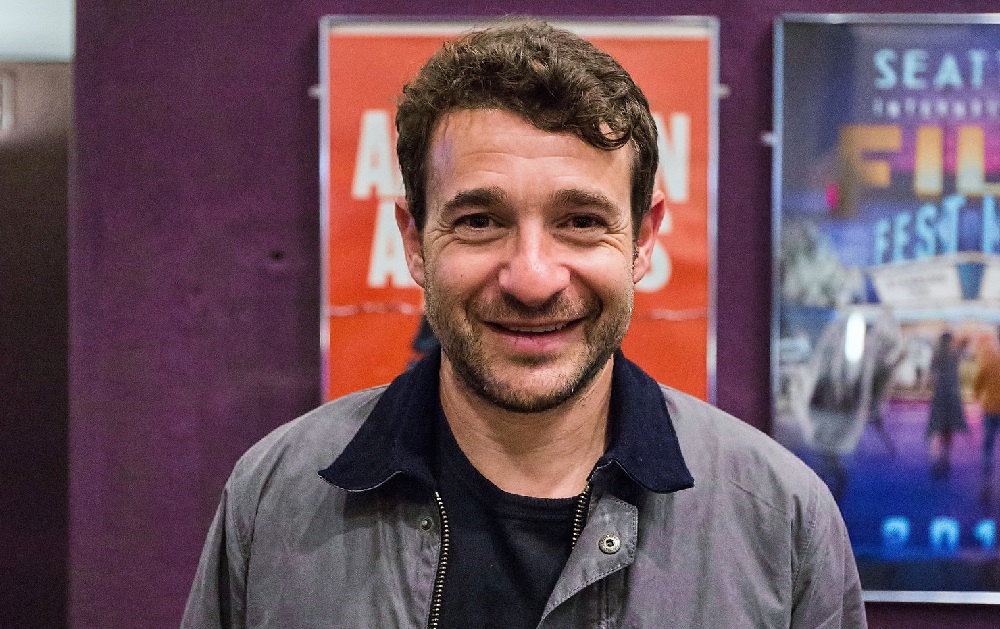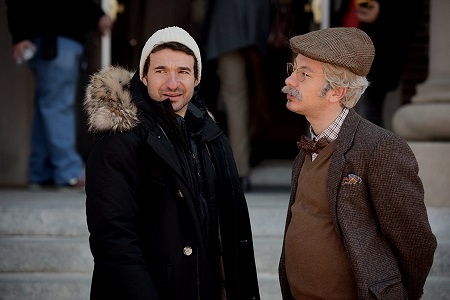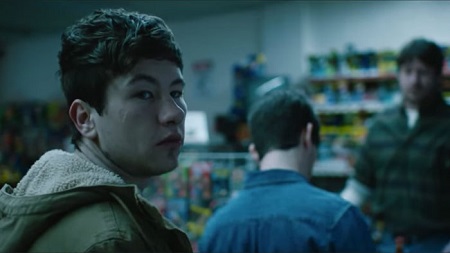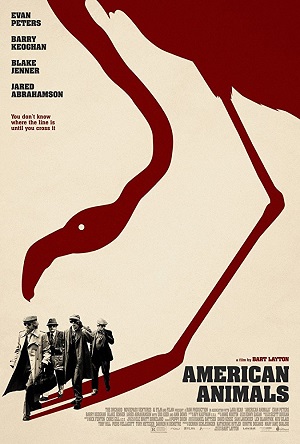
“American Animals” – Interview with Bart Layton
by Sara Michelle Fetters - June 8th, 2018 - Film Festivals Interviews
a SIFF 2018 interview
Bigger Conversations
Truth, Lies and the Pursuit of Immortality Collide in Bart Layton’s American Animals
In 2012 director Bart Layton wowed people with his dynamic, edgily creative documentary The Imposter. The story of a young man who claims to be a grieving Texas family’s 16-year-old son who had been missing for three years, the film blurred the line between the truth and a lie to such a fascinating degree by the time the film had come to an end knowing what was fact and what was fiction was practically impossible. It really was a case where truth was stranger than any fictional narrative ever could have been, the whole thing a mind-blowing shell game that built to an unforgettable final reveal.
Six years later Layton follows up that impressive piece of documentary subterfuge with American Animals, an equally idiosyncratic cinematic endeavor. Once again he is working from a true story, this time the 2003 attempted heist of a cache of rare, seemingly priceless first editions from Transylvania University’s library, including John James Audubon’s Birds of America. White, from privileged backgrounds, seemingly having perfect futures all laid out in front of them, these four men, Warren Lipka, Spencer Reinhard, Eric Borsuk and Chas Allen, all attended this Lexington, Kentucky college and, almost on a whim, decided to try and pull the perfect crime.
It all goes hopelessly wrong, of course, and it doesn’t take very long for law enforcement to figure out who was involved with the heist. But Layton isn’t so much interested in the hows as he is in the whys, the filmmaker going out of his way trying to dig into the reasons these four felt the need to attempt such a foolhardy robbery.
One part documentary, one part narrative reenactment (actors Even Peters, Barry Keoghan, Jared Abrahamson and Blake Jenner portray the four youngsters), the movie bounces back and forth between varying recollections and points of view as it attempts to get to the heart of what happened. In the process, memory becomes a hazy vehicle that is as flawed and as vague as any fictionalized narrative ever could be. Layton pulls no punches, allowing all four men, their families and even some of those they callously terrorized to all speak for themselves, their idiotic pursuit for fame and immortality speaking to a crack in the American Dream few want to talk about let alone admit even exists in the first place.
I had the pleasure to sit down with the director while he was in town to screen American Animals during this year’s Seattle International Film Festival. Here are some of the highlights from our freewheeling conversation:
Sara Michelle Fetters: How did it go last night? Did you have a good time?
Bart Layton: It was great. I didn’t sit in on the screening; you come in at the end. Do the Q&A. But the reaction seemed to be kind of great. There was a lot of excitement. People seemed to be loving the film, which is obviously good as far as I’m concerned. [laughs]
Sara Michelle Fetters: It’s got to be empowering and a little heartwarming for a film that you spent so much time just getting off the ground, let alone getting made, to have such a positive reception at these festivals. I think I read that it took you, what, six or seven years to get this picture made?
Bart Layton: It was probably six years since I found the story. In terms of the work, writing, directing and editing, that is probably a couple years. So it was a pretty long process, start to finish.
But, yes, I’m definitely happy people have been responding as they have. There’s always that thing where you put all of that effort in and you actually don’t have any sense of what’s going to happen next. I’ve got friends who’ve done the same, worked harder and longer on a project than I have on this one, and their movies haven’t been picked up and may never see a theatrical window. That’s pretty painful. It’s a shame, don’t you think?
Sara Michelle Fetters: Without question.
For you, though, why did this story speak to you so loudly? What was it this one that fascinated you to the point you knew this was a film you just had to make?
Bart Layton: First of all it has to be a ripping story. It has to be a kind of “what’s going to happen next” story. But more important than that, or equally important, I think that it speaks to a kind of way into a bigger conversation about something in the culture or something in the way we live. A good story’s not really all you need. You have to have more. This story, it had that “more.”
Since making The Imposter, I’ve had offers to make a lot of big studio movies and none of them really feel like anything other than they have that first bit, that initial seed of a good idea. They have a fun story or they are a thriller. But they’re not really about anything. None of them. The Imposter was a film equally about self-deception as it was about deception, about those lies we choose to believe. That’s why I made it.
Sara Michelle Fetters: And this story had that, “more.”
Bart Layton: Yes. It did. To answer your question, I thought this was a great and interesting story. What kind of people, you know, try to do something like this? And when I found out they were young, privileged and well-educated? That was kind of my okay to know there must be something more to their story. I wanted to understand a little more about them and their motivations, that was the thing that made me think this was a story that needed telling.
A lot of what they said is in the letters we exchanged, because at the point we were conversing they were all in prison; almost all of that is in the film. That’s how the whole thing began, that correspondence with them. The things they wrote in their letter, it was amazing. First, and most importantly, they were very honest. But secondly they were just so not what I expected them to be. They were surprisingly intelligent. They were very articulate. They were very erudite. A lot of what they talked about was a need to be special, a need to leave a mark on the world, a need to do something that would completely shake up everything about their lives and their existence. That was a thing I felt was very relatable.
Just before you walked in a young woman from a college newspaper was talking about how deeply relatable this story was. She wants to be a writer and she’s worried about that she’s never going to have a story to tell because she’s white and privileged and all the rest of it. So, it felt relevant to her in a way. It’s that kind of response that what made me say that this could be a great heist movie but also realize that it had to deliver on a variety levels because it was a story that could be so much more than just another thriller about a heist.
Sara Michelle Fetters: This story, it is oddly relevant for what is going on in America right now in regards to these larger conversations that we’re having, especially in regards to questions of white privilege and toxic masculinity, all that stuff. In this weird way it feeds into that conversation and gives you a great insight into this sort of this laissez faire mindset.
Bart Layton: Yeah. Exactly. I think you might be right. I mean, I don’t think they really planned on going through with it [the heist]. I think they fell in love with the fantasy. One of them described it to me in one of the letters that this was their version of Fight Club. It was a secret that they had that made them different from everyone else. I don’t think they thought that they were going to go through with it. They just were enjoying the role play and then it went way too far.
Sara Michelle Fetters: Why tell the story as part documentary and part reenactment? Why go back and forth between the dramatization, the thriller and the real guys and their families sitting there talking about this?
Bart Layton: For the exact reason that I was saying earlier. Because I think if you didn’t include them it would be a smaller, more disposable story. It would be kind of the story of the crime. It would be hard to relate to them. I think you would think, “What a bunch of idiots.”
They had all of these opportunities and they squandered them while doing this stupid thing. But I think it’s the same thing that made me want to tell the story and that was these people and the way they talk about their reasons. I also thought we potentially had the opportunity to find a new way of telling a true story that we hadn’t seen before. At least, that was the idea.
The simple intention was that your emotional investment would be heightened, would be greater because you looked them in the eye. You don’t get to go off into movie world where everything’s fine and you walk out unscathed. With this you’re like, “What?” With this, you’re constantly reminded it really happened and because of that you’re like, “Where is this going and how is it going to turn out?” You got more skin in the game.
Sara Michelle Fetters: I think this way of telling the story makes concrete the whole Rashomon way they have looking back on things. I mean, these guys were all together planning this together and yet they all still have different interpretations of how stuff happened. It’s fascinating.
Bart Layton: Totally. And that’s the thing. They’re not just unreliable narrators there’s also these memories that are totally unreliable as well. That was one of the things I wanted to do. I wanted to invite the audience into a movie in a slightly different way. We constantly go to movies and the beginning it says, “Based on a true story,” and then it’s like that’s a license to be Hollywood and basically make the rest of it up. I didn’t want that. I wanted this to make you feel like you were part of the story and part of the progress. I wanted you to question how movies get fictionalized and how stories get Hollywood-ized.
Sara Michelle Fetters: But I also think it also helps us question, not so much our own reality, but our own perception of what our lives are, the events that have helped make us who we are.
Bart Layton: Exactly. It’s all about crossing a line that should never be crossed. I think if it had been more serious, if someone had died, we could never tell the story in this way. What it’s really about is this moment in which they cross a line and they kind of can’t cross back. In that moment they instantly regret it, the instantly wish they could take it back but they can’t and you see them unraveling.
Sara Michelle Fetters: Even though you’d been having this correspondence with them and you had gotten so much information, it’s one thing to get all of that in writing and another thing to have them sit down in front of a camera. Was there some trepidation there from them to actually be in the film?
Bart Layton: I don’t think they were trepidatious until the day of filming and then they were suddenly, “Oh, shit! This is really happening. We’re really doing this.” [laughs]
I think at that time they realized it was going to bring the whole thing back up. This had been a huge thing within the community and within their families. It had been devastating. So it was difficult because they’d written a lot of things in the letters, most of which I put into the script. When we sat down to do the interviews I wanted to hear them say the things. Some of those things they talked about and said and some of the things they didn’t say. So I was faced with this problem of having written a screenplay, got the film financed off the back of the screenplay and now I’m not able to get the lines out of the real guys.
The last thing you want to do is turn them into actors. That would never work. They needed to speak their own truth. They had to say it, not me. In the end, I threw the script away and I was like, let’s just sit down and have a very honest conversation about what happened. Afterwards, I went back into the script and rewrote around what they had actually said.
Sara Michelle Fetters: Because of your documentary background, because you’ve done the “Locked Up” series, does that help you in situations like this?
Bart Layton: Massively. I’ve had a lot of experience getting stories out of people. But, you know, this was totally different because this was a narrative movie with these unconventional, nonfiction elements. There isn’t really a template for that. When we were coming to plan the schedule and the budget everyone was like, I’ve never done or planned anything like this before. How do we do it?
It’s exciting because you’re breaking new ground but it’s difficult because there isn’t a template. Everyone’s wondering if you’re absolutely sure that it’s going to work. And I’m always like, yeah. Of course. It’s going to be great. But even I’m not sure until I get into the edit room and see for myself that it’s going to work in the same way I saw it working on paper. Not that I could tell anyone else that. [laughs]
Sara Michelle Fetters: How hard was it casting the actors to portray these guys?
Bart Layton: I’m not great at making snap decisions. I’m better at making good decisions and sometimes it takes a long time to get to that. With the casting process, I just wanted the best actors, not the most similar looking. They had to be the best actors.
There was a point where we could have cast the biggest names in this age group. The script suddenly caught fire in L.A. We had the option to cast really well known young men and I didn’t want that. I didn’t want them to come with the baggage of all of those big franchise movies that we’re all familiar with. I wanted them to be real people. They needed to look real, they needed to be more authentic and I didn’t want any of these Hollywood pretty boys. I wanted people that looked like you and I.
Sara Michelle Fetters: It’s interesting that you put it like that because, even in the case of Evan Peters, he might be a major part of this big franchise (the X-Men films) but he still manages to come into this without the baggage of portraying Quicksilver.
Bart Layton: Exactly, He just came into the room and it was like, yeah, wow, he’s just exceptional.
Sara Michelle Fetters: Evan and Barry Keoghan, the way they work off one another, there’s magic there.
Bart Layton: That is the thing. I’ve never written a screenplay before and I’m not one of those people who sit there writing. I don’t do all the dialogue in a lab and stand up and go and try and do the whole performance of it because that’s just not how I operate. I write, that’s it, and then I hope that it feels true.
It was nerve-wracking. It wasn’t until the actors turned up and we started doing rehearsals that I felt like I could breathe. It was then that I knew the stuff I’d written was good. That they were good. That they were great. I knew then we were going to be fine.
Sara Michelle Fetters: I have to say, as terrific as Evan and Barry are, I was really blown away by Jared Abrahamson. That scene when you actually get into the heist, that whole sequence I couldn’t take my eyes off of him. I’m just watching him and it’s just heartbreaking.
Bart Layton: He’s a natural. He’s got a kind of natural quality about him. I found myself not giving him a huge amount of direction. Often he just was very solid. He just got it. Jared’s so understated, doesn’t feel the need to do too much. He’s just so good here.
Sara Michelle Fetters: Right at the end, you sort of tell us also maybe not everything some of what these guys are telling us is exactly the truth.
Bart Layton: Exactly. It’s that unreliable narrator aspect I was talking about earlier. At one point there was sort of more of that in the movie. But I discovered some places in the story you just don’t want to interrupt the flow of the drama but in other places there were points I wanted to invite the questioning of whether things happened in the way they are depicted. There’s this idea that, not just that they’re unreliable narrators, but also memories themselves are also unreliable.
A week from now you won’t be wearing sunglasses on your head in my memory. Whatever it is, it will be different. Things will morph and change. As a dramatist, you can either choose if two people are giving you two different versions. You can go, I’ll just choose the cooler version because that’s more dramatic. Or you say, no, let’s do both of versions and then invite the audience into this kind of game of, “what if.” Instead of tricking the audience you’re inviting them into the process, into this game. We all entered that type of contract when we go into a making a film out of a true story.
Listen, we all know that Natalie Portman is not Jackie Kennedy but we’re like, yeah, let’s go, we want to believe it. But then you’re asking yourself, did that really happen? Did Jackie Kennedy really say or do that? And then at the end you see a bunch of photographs and then you go and Google Jackie Kennedy, or Molly from Molly’s Game, or anyone else it might be in a movie supposedly based on real people telling a real story.
I wanted to remove that. I wanted you to be kind of having your cake and the ability to eat it, too, in a way.
Sara Michelle Fetters: What inspires you as a filmmaker?
Bart Layton: It has to be a great story. I’ve got a very short attention span. I’m a very slow reader, probably dyslexic. If I’m not like, “What happens next?” that is problematic. But it’s equally problematic to feel like that was a great book and I really enjoyed it but ultimately I’m never going to think about it for a split second after I’m done reading.
In this case, there had to be something about these questions of identity, masculinity, privilege and the pressure we’re all living under to be interesting, different and be special. All of that had to be there and it was. To answer your question, it has to be a great story but it has to be about something more. Something that you can go to the pub afterwards and have a proper talk about. Did that happen? What does that mean? What would you do? There’s always more to it.
Talking about that young woman who was in before you again, she said she found the movie so deeply relatable because most of her and her friends, she said, “If we don’t have a Wikipedia page by the time we’re however old, I guess we’re not important or we haven’t made it.” That’s so telling, right? Making a mark, having our lives mean something, that is a huge driver for all of us in our lives. I think it was also one of the main drivers in this crime. Those are the kinds of conversations that would be good to have people talking about.
Sara Michelle Fetters: Can we slow down? Can we get out of this technological and societal malaise that we’re in that can potentially lead to stuff like this? Can we connect again as human beings, in real life, away from our computers, cell phones, social media and all of the rest?
Bart Layton: I think so. I hope so. Ultimately it just becomes a total choice. Because if you’re not in it, social media and all of the rest of that stuff, or if you step away, as soon as you are away from it all it’s suddenly not in your ether anymore. As soon as you turn it off you realize you don’t need any of it. It’s like when you go away and there’s no WiFi or anything and suddenly it’s just like an out of mind thing. You stop caring about it. If I put it out of sight, suddenly I can just think about where I want to be and what I want to do, what’s important to me. I stop thinking about what’s important to me in the eyes of other people. It’s that simple. Don’t you think so?
– Interview reprinted courtesy of the SGN in Seattle








